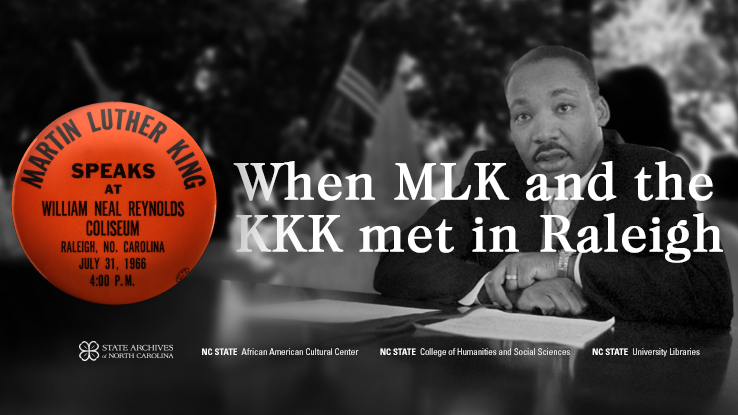
Promotional image for the "When MLK and the KKK met in Raleigh" exhibit.

Promotional image for the "When MLK and the KKK met in Raleigh" exhibit.
For most people in Raleigh, July 31 will be a normal Wednesday; but it’s an important anniversary for the city. On that date in 1966, Martin Luther King, Jr. spoke to a gathering of about 5,000 people at NC State’s Reynolds Coliseum, while the Ku Klux Klan marched in protest through downtown.
If not for the scholarship of NC State’s Jason Miller and Margaret Baker, this important date in the nation’s civil rights history might have been forgotten. Miller, an NC State English professor and noted King scholar, organized "When MLK and the KKK Met in Raleigh," an exhibit of photography from throughout the day, that showed at the African American Cultural Center and is currently in the Hunt Library’s iPearl Immersion Theater. When the exhibit prompted the discovery of some home movie footage of the day, Baker, a Ph.D. candidate, helped produce the 10-minute "King and the Klan: A Visual Experience"—originally presented at the Hill Library’s Cyma Rubin Visualization Gallery on January 17—as well as a 20-minute companion preview video.
Now Miller and Baker have donated materials from their research and production of this work to the Libraries’ Special Collections Research Center (SCRC).
“The Libraries has been instrumental at every step of the process in both sharing this research with the campus community and fulfilling my research philosophy of engaging with the general public.” — Dr. Jason Miller
The Jason Miller Papers include materials from his work on Dr. King as well as some of his other projects, and the Margaret Baker Collection contains elements of her project, all available upon request. Baker’s video is also available to view on the SCRC’s Rare & Unique Digital Collections website.
"Collaborating with the SCRC is a natural extension of the critical role the Libraries has played from the very beginning of my research,” Miller says. “The Libraries has been instrumental at every step of the process in both sharing this research with the campus community and fulfilling my research philosophy of engaging with the general public.”
“Having this work preserved for the next generation signals the positive intentions we have for educating the wide range of people directly impacted by our institution. The long process of finely documenting Martin Luther King, Jr.’s overlooked 1966 visit to NC State has often felt like detective work, and it has brought me into contact with wonderful staff, alumni, and community members of an earlier generation who have taught me that history also lives in attics, closets, and basements—not just in textbooks."
University Archivist Todd Kosmerick is proud that the SCRC will not only preserve Miller’s and Baker’s scholarly work but will also provide public access to the results of that work in different forms at the Libraries.
“Before Dr. Miller started his research on this event, I had no idea it had happened. There is actually almost no mention of it in the University Archives,” Kosmerick says. “Once we started working with Dr. Miller, I was able to find a few documents about it in the university's historical records, but most of his research came from looking at local newspapers and talking with people in the Raleigh community or who had lived here at the time.”
“Through these sources, he pieced the story back together, and now that it has been recovered, we want to make sure it is preserved and not forgotten again. And the immersive display that Margaret Baker made with Dr. Miller helps bring together some of the source material in a visual format to make it more accessible. The SCRC is excited to be able to preserve these materials and make them accessible to the university community and beyond.”